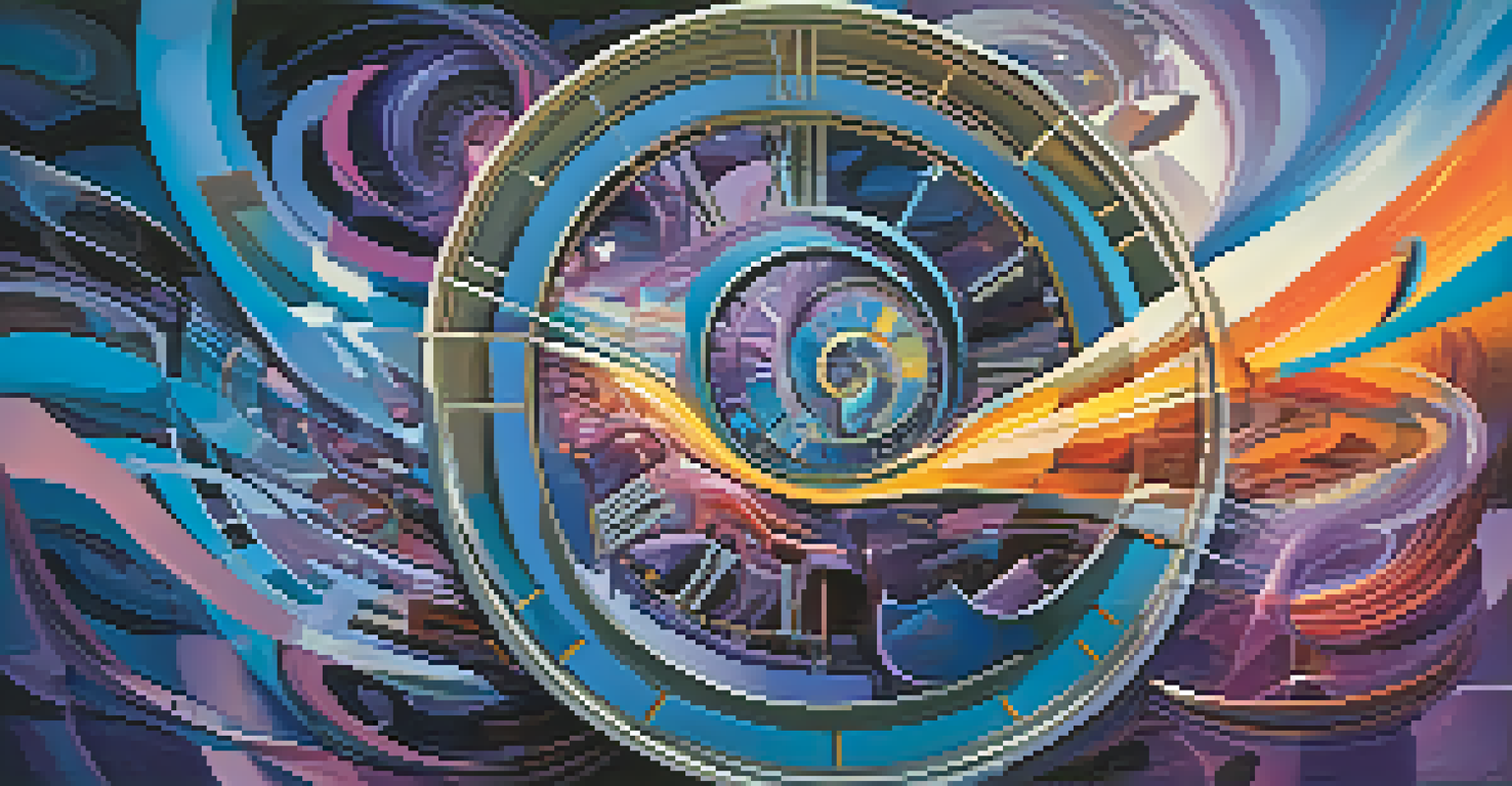The Science Behind Hallucinogens and Time Perception Changes

What Are Hallucinogens and Their Effects?
Hallucinogens are substances that significantly alter perception, mood, and cognitive processes. Common examples include LSD, psilocybin (magic mushrooms), and mescaline. These substances can induce vivid visual and auditory hallucinations, leading users to see and hear things that aren't present.
The experience of time is not just a measure—it is an emotional and cognitive phenomenon that shapes our very consciousness.
The effects of hallucinogens are often unpredictable and depend on various factors including dosage, setting, and individual psychology. While some users report profound and enlightening experiences, others may encounter anxiety or paranoia. Understanding these effects is crucial as they relate directly to how time is perceived during these experiences.
Interestingly, the impact of hallucinogens on time perception can lead to feelings of time dilation, where minutes can feel like hours. This alteration in time sensation is a central theme in the study of how these substances affect the brain and consciousness.
The Brain's Biological Clock and Time Perception
At the heart of our understanding of time perception lies the brain's biological clock, often linked to a structure known as the suprachiasmatic nucleus (SCN). This tiny cluster of cells regulates our circadian rhythms, which influence our daily cycles of sleep, wakefulness, and even how we perceive time.

When hallucinogens are introduced into the system, they can disrupt the normal functioning of the SCN and other neurotransmitter systems, particularly serotonin. Changes in serotonin levels can distort the brain's timing mechanisms, leading to altered perceptions of how long events last.
Hallucinogens Alter Time Perception
Substances like LSD and psilocybin can significantly distort users' experience of time, often leading to feelings of time dilation.
This disruption can manifest as a subjective experience where time stretches or contracts. For instance, during a hallucinogenic trip, one might feel as though they are experiencing a moment for an eternity, creating a unique and often confusing relationship with time.
How Do Hallucinogens Induce Time Dilation?
Time dilation, a phenomenon where time seems to slow down or speed up, is a common experience reported by users of hallucinogens. This can be attributed to changes in how our brains process sensory information during altered states of consciousness. When the brain is bombarded with unusual stimuli, it can lead to an overwhelmed perception of time.
Psychedelics can help us to understand the nature of consciousness and the subjective experience of time.
For example, during a hallucinogenic experience, one might focus intensely on a single thought or visual, causing other moments to fade away, thus stretching the sensation of time. This can create an experience where a short duration feels like it lasted much longer.
Moreover, this altered perception can lead to introspective experiences, where users reflect deeply on their thoughts and emotions. As they lose track of physical time, they often report a sense of connection to the universe, creating a profound sense of significance in those moments.
The Role of Context in Time Perception
Context plays a pivotal role in shaping our perception of time, especially under the influence of hallucinogens. The environment, mood, and even the company we keep can significantly influence how we experience time. A calming setting may result in a serene feeling of time flowing gently, while a chaotic environment might lead to feelings of time racing by.
In the context of hallucinogens, users often find themselves deeply influenced by their surroundings. A beautiful landscape might amplify the feeling of time slowing, while a stressful or uncomfortable space could lead to time feeling unbearably long.
Context Influences Time Experience
The environment and emotional state of users play a crucial role in shaping how they perceive time during hallucinogenic experiences.
This highlights the importance of 'set and setting'—a term used in the psychedelic community that emphasizes the user's mindset and environment. By curating a positive and safe context, users can enhance their experience and potentially enjoy a more profound perception of time.
The Science Behind Altered Time Perception
Research into how hallucinogens affect time perception is still evolving, but scientists have begun to pinpoint specific brain areas involved. Neuroimaging studies suggest that the default mode network (DMN), which is active during self-reflection, plays a crucial role in how we perceive time under the influence of these substances.
The DMN's activation can lead to altered states of consciousness, where the usual boundaries of time and space feel less rigid. This can result in a sensation where past, present, and future seem to merge, creating a unique narrative about one's life experiences.
As researchers delve deeper into these neural mechanisms, they are uncovering the complex interplay between brain chemistry and our perception of time. Understanding these connections could have implications not just for recreational use but also for therapeutic applications of hallucinogens.
Potential Therapeutic Benefits of Altered Time Perception
Interestingly, the way hallucinogens alter time perception might hold therapeutic potential. For individuals dealing with trauma or depression, the feeling of time distortion can provide a fresh perspective on their experiences, allowing them to process emotions in a new light.
Therapists are exploring how guided psychedelic experiences can help patients break free from rigid thought patterns, enabling them to revisit past memories with a different emotional lens. This can facilitate healing and emotional growth, leading to a more profound understanding of one’s life narrative.
Therapeutic Potential of Time Dilation
Altered time perception from hallucinogens may offer therapeutic benefits, allowing individuals to revisit past traumas with a fresh perspective.
As research progresses, the promise of using hallucinogens in controlled therapeutic settings is becoming more apparent. By harnessing the power of altered time perception, mental health professionals hope to help clients navigate their emotional landscapes more effectively.
The Future of Hallucinogen Research and Time Perception
The study of hallucinogens and their effects on time perception is an exciting frontier in neuroscience and psychology. With growing interest in the therapeutic uses of psychedelics, researchers are eager to uncover more about how these substances can reshape our understanding of consciousness.
Future studies may involve more sophisticated neuroimaging techniques and larger participant groups to better understand the nuances of time perception under the influence of hallucinogens. This could provide deeper insights into the brain's mechanisms and the broader implications for mental health treatments.

As societal attitudes towards psychedelics evolve, so too does the potential for groundbreaking discoveries. By continuing to explore the complex relationship between hallucinogens and time perception, we may unlock valuable knowledge that can enhance our understanding of the human experience.